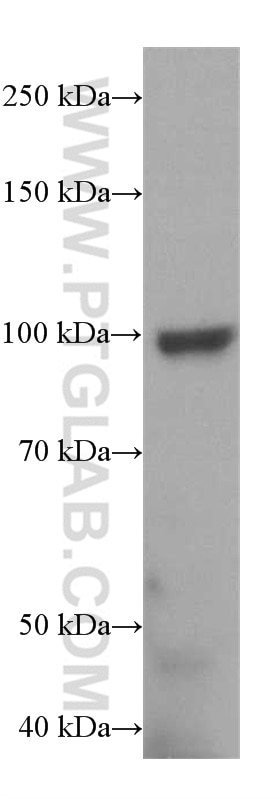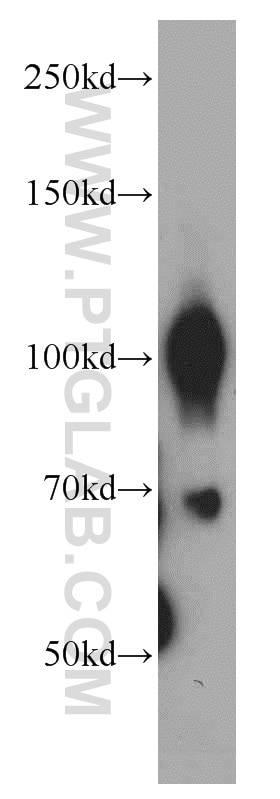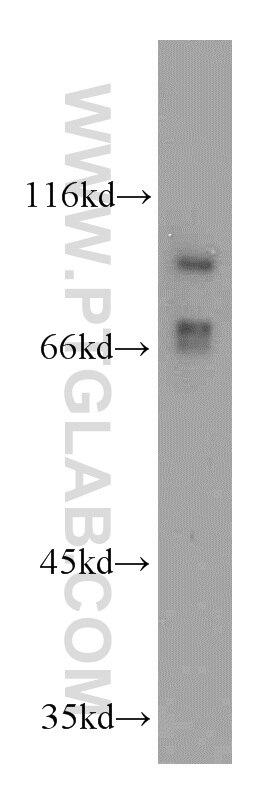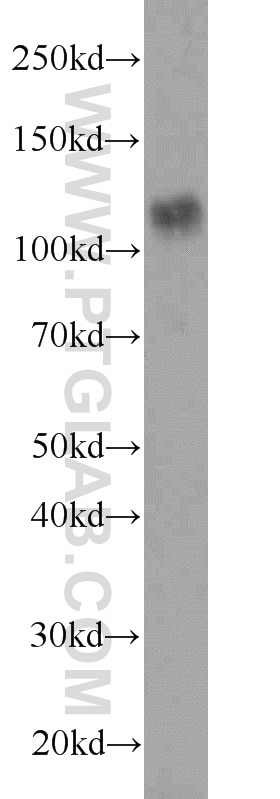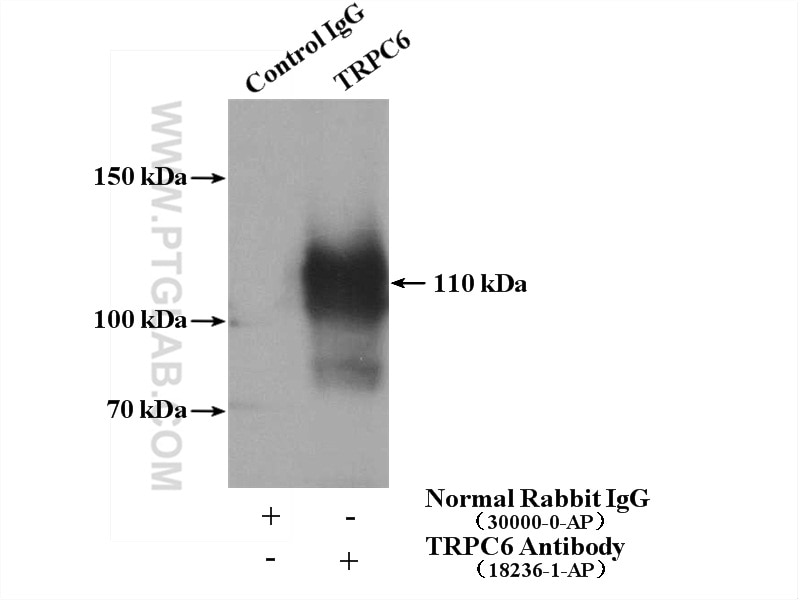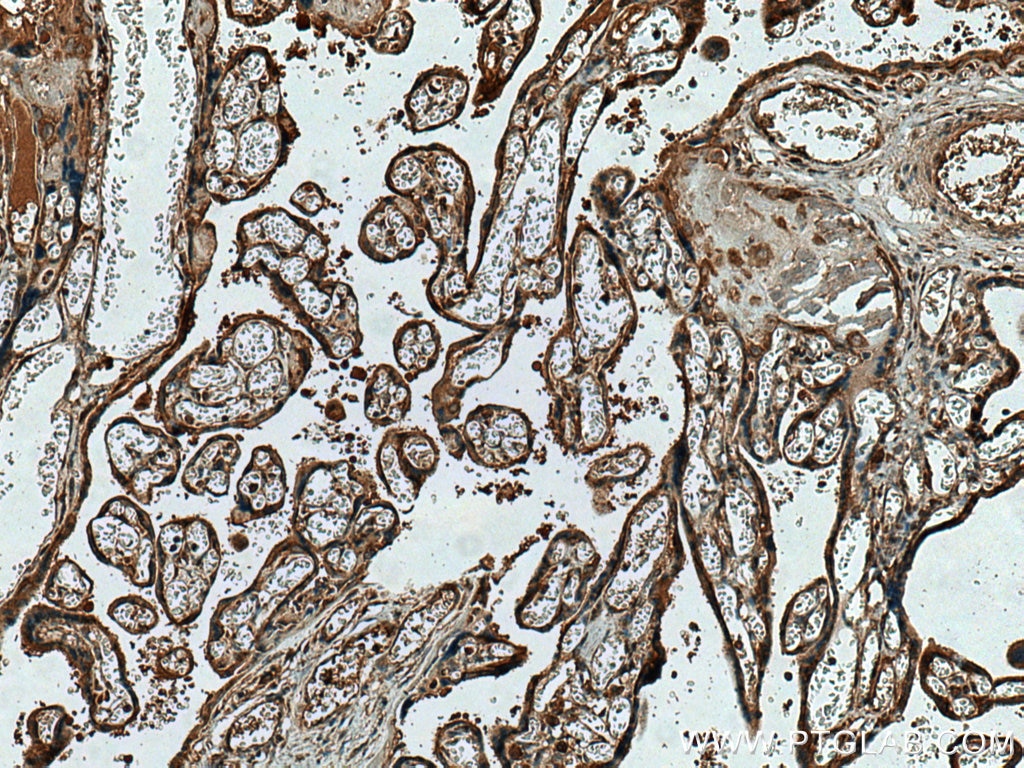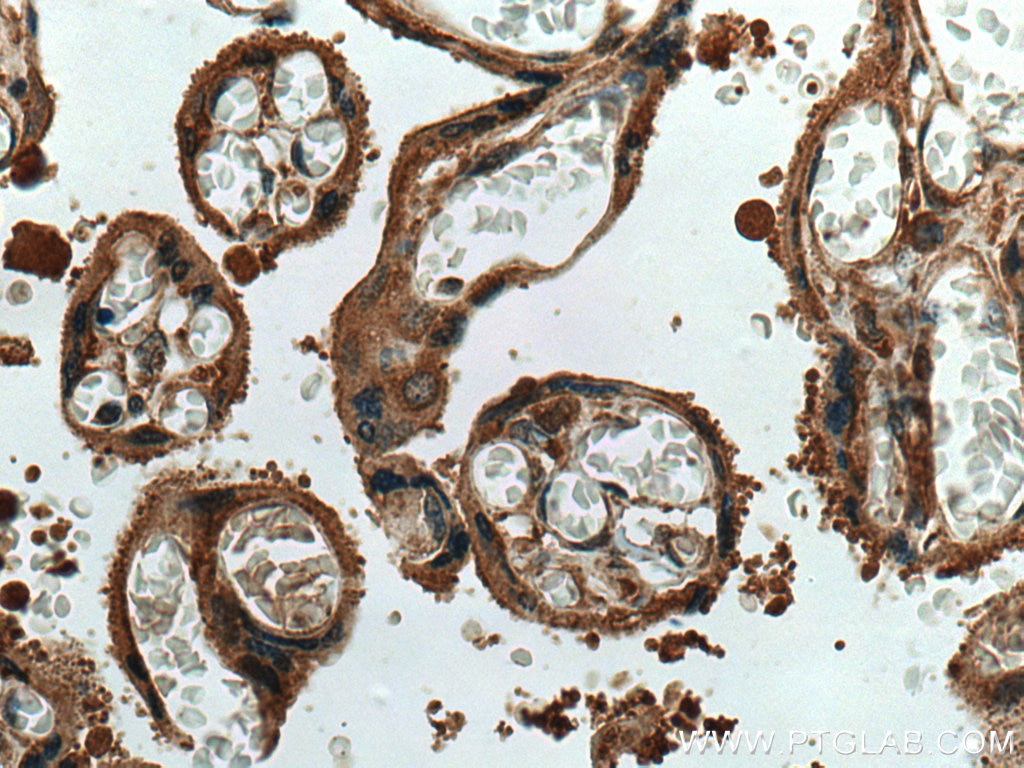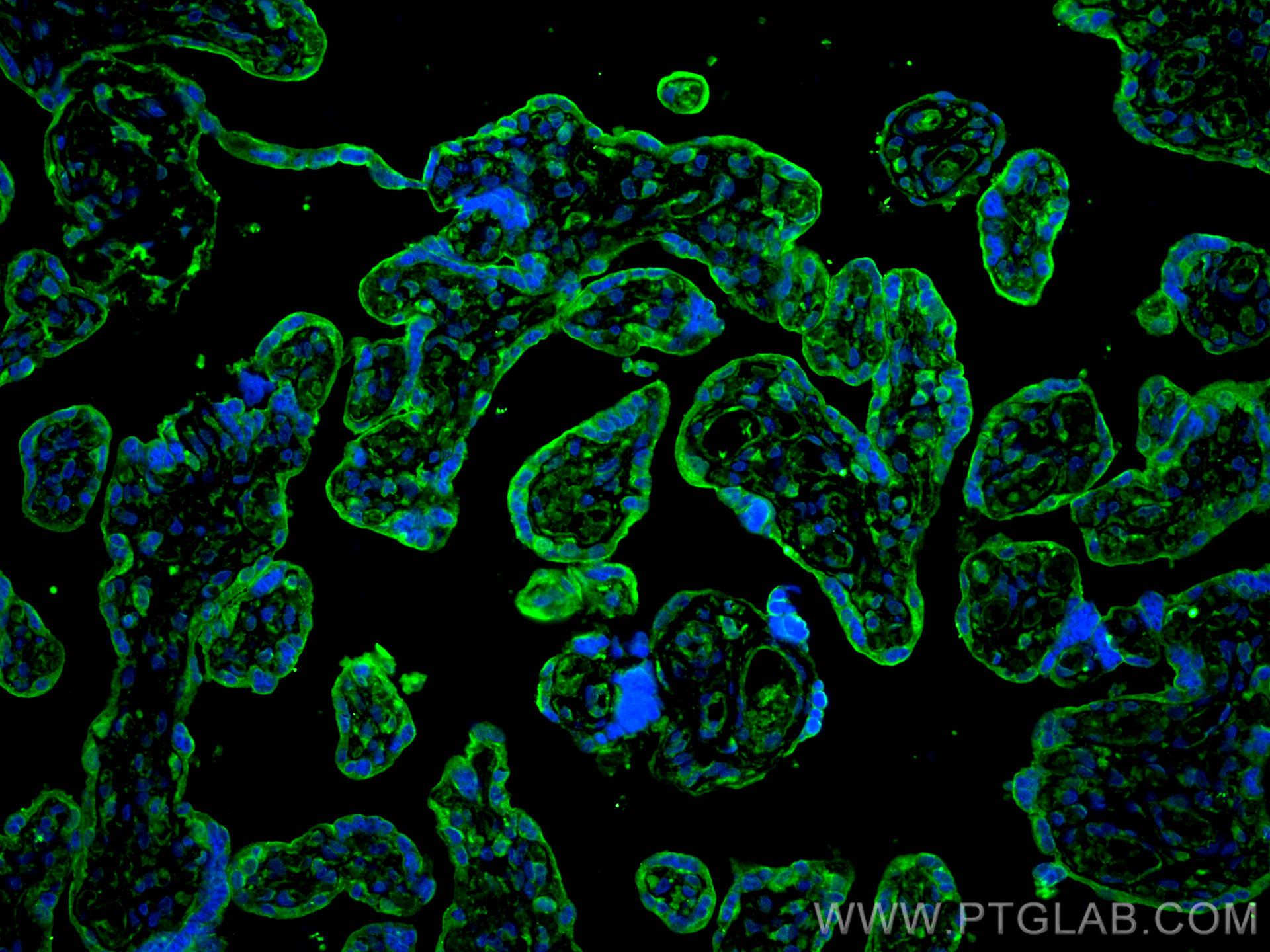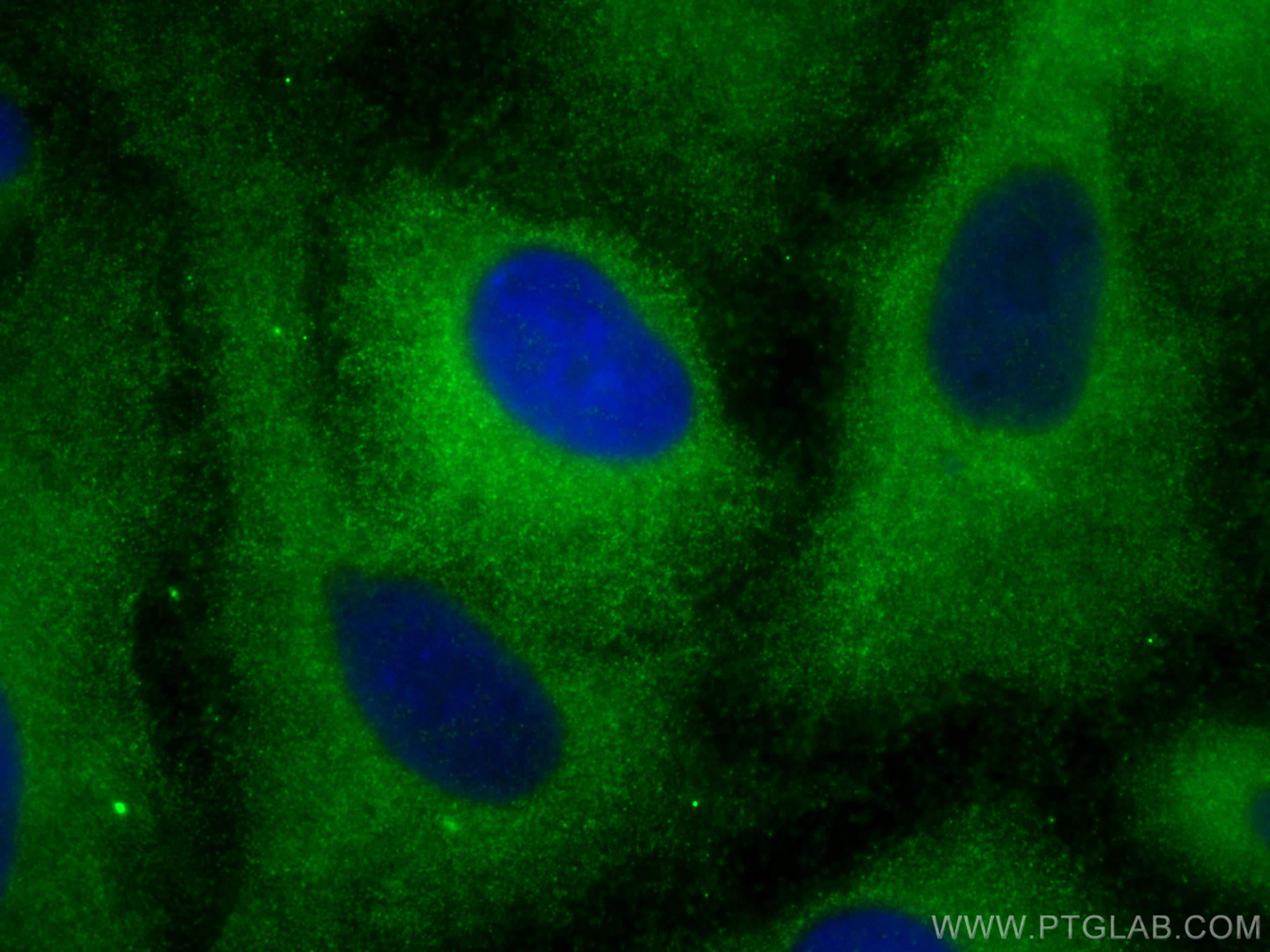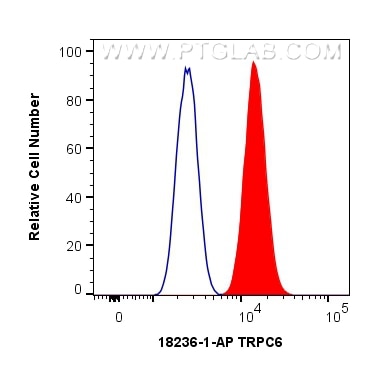Tested Applications
| Positive WB detected in | mouse brain, COLO 320 cells, mouse lung tissue |
| Positive IP detected in | mouse lung tissue |
| Positive IHC detected in | human placenta tissue Note: suggested antigen retrieval with TE buffer pH 9.0; (*) Alternatively, antigen retrieval may be performed with citrate buffer pH 6.0 |
| Positive IF-P detected in | human placenta tissue |
| Positive IF/ICC detected in | A549 cells |
| Positive FC (Intra) detected in | A549 cells |
Recommended dilution
| Application | Dilution |
|---|---|
| Western Blot (WB) | WB : 1:500-1:1000 |
| Immunoprecipitation (IP) | IP : 0.5-4.0 ug for 1.0-3.0 mg of total protein lysate |
| Immunohistochemistry (IHC) | IHC : 1:50-1:500 |
| Immunofluorescence (IF)-P | IF-P : 1:50-1:500 |
| Immunofluorescence (IF)/ICC | IF/ICC : 1:200-1:800 |
| Flow Cytometry (FC) (INTRA) | FC (INTRA) : 0.40 ug per 10^6 cells in a 100 µl suspension |
| It is recommended that this reagent should be titrated in each testing system to obtain optimal results. | |
| Sample-dependent, Check data in validation data gallery. | |
Published Applications
| KD/KO | See 2 publications below |
| WB | See 11 publications below |
| IHC | See 1 publications below |
| IF | See 9 publications below |
| IP | See 1 publications below |
| FC | See 1 publications below |
Product Information
18236-1-AP targets TRPC6 in WB, IHC, IF/ICC, IF-P, FC (Intra), IP, ELISA applications and shows reactivity with human, mouse samples.
| Tested Reactivity | human, mouse |
| Cited Reactivity | human, mouse, rat |
| Host / Isotype | Rabbit / IgG |
| Class | Polyclonal |
| Type | Antibody |
| Immunogen |
CatNo: Ag12976 Product name: Recombinant human TRPC6 protein Source: e coli.-derived, PGEX-4T Tag: GST Domain: 1-405 aa of BC093658 Sequence: MSQSPAFGPRRGSSPRGAAGAAARRNESQDYLLMDSELGEDGCPQAPLPCYGYYPCFRGSDNRLAHRRQTVLREKGRRLANRGPAYMFSDRSTSLSIEEERFLDAAEYGNIPVVRKMLEECHSLNVNCVDYMGQNALQLAVANEHLEITELLLKKENLSRVGDALLLAISKGYVRIVEAILSHPAFAEGKRLATSPSQSELQQDDFYAYDEDGTRFSHDVTPIILAAHCQEYEIVHTLLRKGARIERPHDYFCKCNDCNQKQKHDSFSHSRSRINAYKGLASPAYLSLSSEDPVMTALELSNELAVLANIEKEFKNDYKKLSMQCKDFVVGLLDLCRNTEEVEAILNGDVETLQSGDHGRPNLSRLKLAIKYEVKKFVAHPNCQQQLLSIWYENLSGLRQQTMAV Predict reactive species |
| Full Name | transient receptor potential cation channel, subfamily C, member 6 |
| Calculated Molecular Weight | 931 aa, 106 kDa |
| Observed Molecular Weight | 100-110 kDa |
| GenBank Accession Number | BC093658 |
| Gene Symbol | TRPC6 |
| Gene ID (NCBI) | 7225 |
| RRID | AB_10859822 |
| Conjugate | Unconjugated |
| Form | Liquid |
| Purification Method | Antigen affinity purification |
| UNIPROT ID | Q9Y210 |
| Storage Buffer | PBS with 0.02% sodium azide and 50% glycerol, pH 7.3. |
| Storage Conditions | Store at -20°C. Stable for one year after shipment. Aliquoting is unnecessary for -20oC storage. 20ul sizes contain 0.1% BSA. |
Background Information
Transient receptor potential canonical (TRPC) channels mediate the influx of different types of cations through the cell membrane and are involved in many functions of the organism (PMID: 28508319). The TRPC subfamily consists of seven members, TRPC1, TRPC2, TRPC3, TRPC4, TRPC5, TRPC6, TRPC7 (PMID: 32872338). TRPC6 is a Ca(2+)-permeable non-selective cation channel expressed in most human tissues. TRPC6 has been considered as potential therapeutic targets for malignant glioma treatment (PMID: 35489424).
Protocols
| Product Specific Protocols | |
|---|---|
| WB protocol for TRPC6 antibody 18236-1-AP | Download protocol |
| IHC protocol for TRPC6 antibody 18236-1-AP | Download protocol |
| IF protocol for TRPC6 antibody 18236-1-AP | Download protocol |
| IP protocol for TRPC6 antibody 18236-1-AP | Download protocol |
| Standard Protocols | |
|---|---|
| Click here to view our Standard Protocols |
Publications
| Species | Application | Title |
|---|---|---|
J Hazard Mater Epigenetic reprogramming of HDAC2 in CA1 excitatory neurons determines Pb-induced non-spatial memory deficits | ||
Biomaterials Nongenetic optical modulation of neural stem cell proliferation and neuronal/glial differentiation. | ||
Proc Natl Acad Sci U S A TRPC6 channel translocation into phagosomal membrane augments phagosomal function.
| ||
Phytomedicine Deciphering the pharmacological mechanisms of Rostellularia procumbens (L) Nees. Extract alleviates adriamycin-induced nephropathy in vivo and in vitro | ||
Br J Pharmacol Catalpol Alleviates Adriamycin-Induced Nephropathy by Activating the SIRT1 Signalling Pathway In Vivo and In Vitro. |
